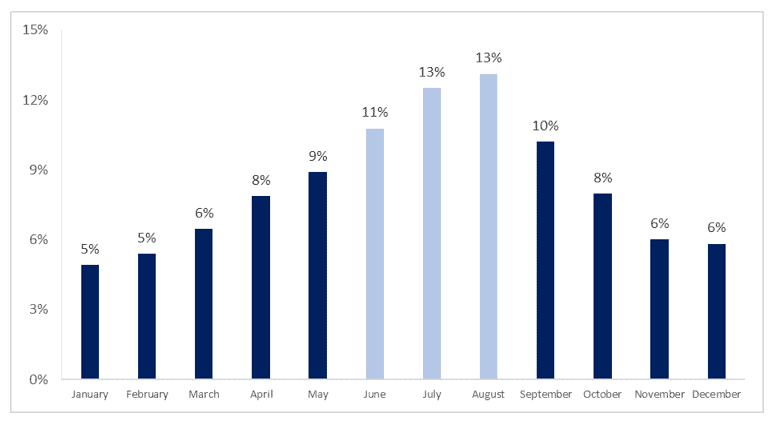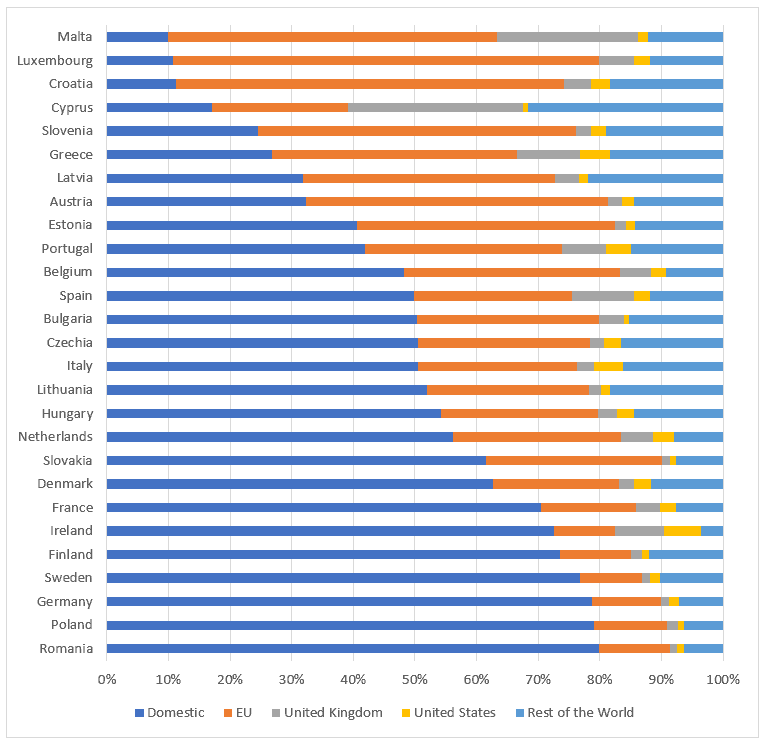Published
Europe’s Summer of Staycation
By: Oscar Guinea
Subjects: European Union

Thanks to Anna Guildea for helpful comments.
The EU lags behind the UK and the US in the percentage of people who have been vaccinated[1]. If anything, this delay has been a heavy blow to many EU citizens who expected a general roll-out of vaccination programmes at the beginning of the year.
The pain of this delay to EU governments will become increasingly obvious when the UK and the US begin to lift their restrictions during the summer of 2021. This will not happen in the EU. Even if the roll-out of Europe’s vaccination programmes are speed-up, many vaccines require two doses – with several weeks between the first and the second – to be fully effective.
As a result of this delay, Europe’s economy will be further hit and there will be one sector that will suffer the most: tourism.
Holidays are a seasonal business with summers being the peak for tourism. In the summer of 2019, June, July and August represented 36% of EU’s tourist’s arrivals. Europe’s delay on vaccination is sure to mean losses for the European tourism industry which are unlikely to ever be recovered.
Figure 1: Percentage of arrivals at tourist accommodation establishments per month in the EU27 (2019)
 Source: Eurostat (Arrivals at tourist accommodation establishments – monthly data). Author’s calculations.
Source: Eurostat (Arrivals at tourist accommodation establishments – monthly data). Author’s calculations.
Tourism isn’t just important for the kind of countries that come to mind when we think about spending our summer sunbathing next to the pool or the sea. While tourism represents 10% of total value added in Cyprus, Greece, or Malta, it still amounts to a significant 4% in Germany[2]. Moreover, businesses in the tourism industry and other businesses that also rely on the consumption of tourists are a significant source of employment for skilled and unskilled labour and revenue for central, regional and local governments. Besides, the ease to travel within the EU might be one of the most visible benefits that many citizens enjoy from belonging to the EU.
The summer of 2021 is likely to be a summer of staycations[3] or at a stretch, of holidaying within the confines of our country of residency. Some measures will be relaxed as they had been in 2020 but the fight against new variants and the efforts to lower the spread of the virus will mean that many travel restrictions will stay.
For most EU countries, domestic tourism will not be enough to compensate for the loss of international travel. For instance, only 10% of stays in Malta came from within their own country. And while it is true that some people who previously went abroad for holidays will stay put, many EU countries rely on an influx of tourism larger than their domestic population.
The good news is that as more and more people will be vaccinated, the current restrictions can be lifted. For example, EU citizens, as well as, citizens from other countries, who have received the vaccine against Covid-19 should be able to travel and enjoy their holidays abroad. They can still carry the virus so precautions about testing, agglomerations, and the need to wear a facemask should remain[4] but since they are protected against the disease, the same restrictions that apply in general shouldn’t apply to them.
The good news for the EU tourism industry is that, together, tourists from the US, UK, and the EU – which will get a large percentage of their population vaccinated in 2021 – represent around 89% of EU total arrivals at tourist accommodations. The figure below shows the percentage of arrivals in hotels, campings, and other short-term accommodations by residents, as well as non-residents coming from other EU countries, the UK, the US and the rest of the world for each EU member state in 2019.
Figure 2: Percentage of arrivals at tourist accommodation establishments by residents and non-residents from other EU countries, the UK, the US, and the rest of the world (2019)
 Source: Eurostat (Arrivals at tourist accommodation establishments by country/world region of residence of the tourist). Author’s calculations.
Source: Eurostat (Arrivals at tourist accommodation establishments by country/world region of residence of the tourist). Author’s calculations.
In many EU countries, draconian lockdowns have been imposed for every new wave of Covid-19, and blanket prohibitions have been carried out without a strong body of evidence as to where, when, and how people get infected. If we are to live with Covid-19 for the foreseeable future, we need a more surgical approach to reduce the spread of the virus.
EU countries must prepare for the summer of 2021 by establishing a system which facilitates travelling to those who have been vaccinated. And while there are some genuine concerns about how to implement such a system, the reality is that countries already record who has been vaccinated and are administering certificates or receipts to those who have been given the jab.
It doesn’t make sense to wait until everyone is vaccinated to start lifting the current restrictions. Making it easier for those who have been vaccinated to travel during summer will have a positive effect on the willingness to vaccinate and on the EU economy.
[1] Our World in Data, checked 17 February 2021
[2] Eurostat. Tourism industries – economic analysis. Source: https://ec.europa.eu/eurostat/statistics-explained/index.php/Tourism_industries_-_economic_analysis
[3] Staycation, see https://en.wikipedia.org/wiki/Staycation
[4] The Economist, 13 February 2021. Special report: The future of travel.